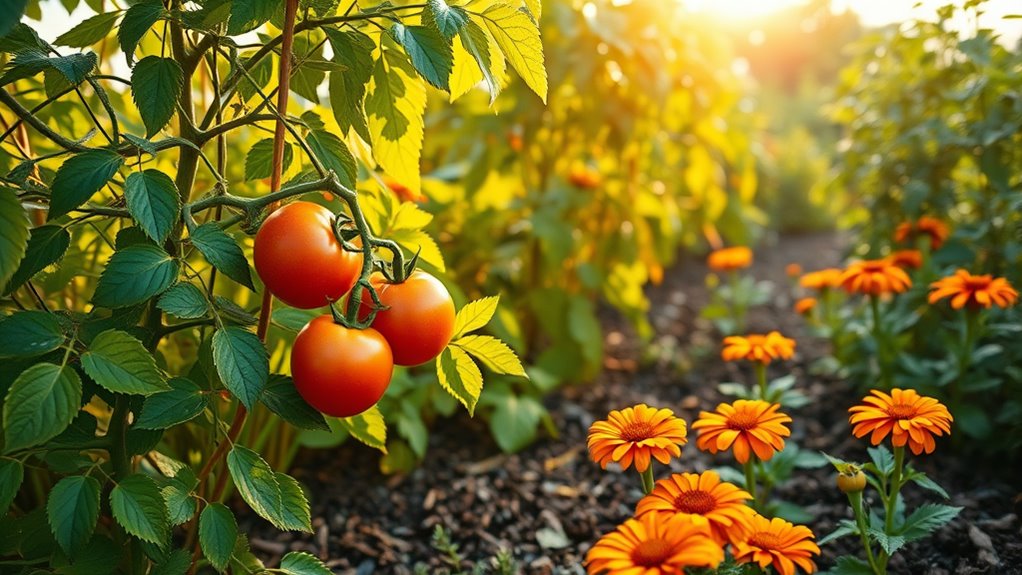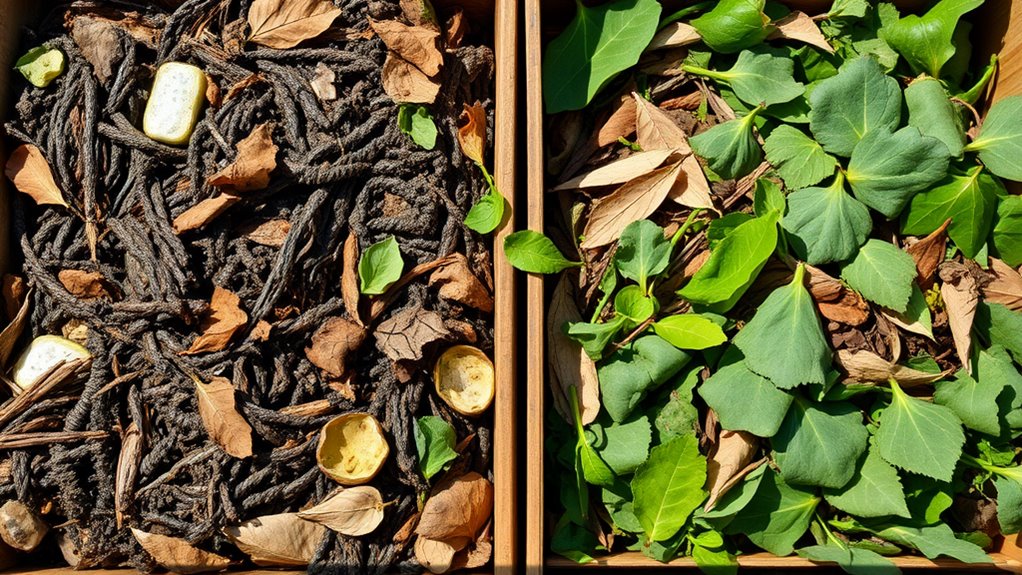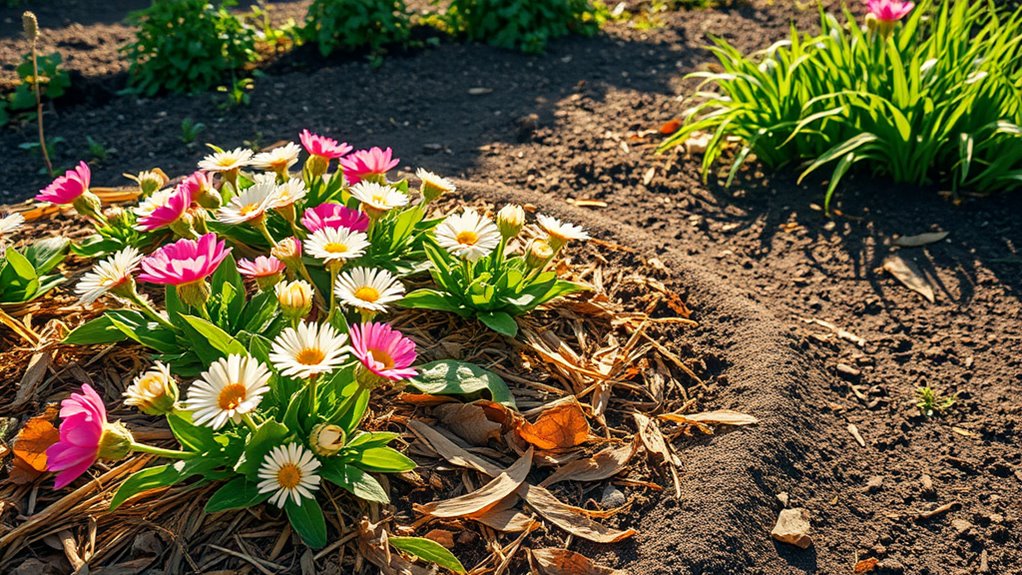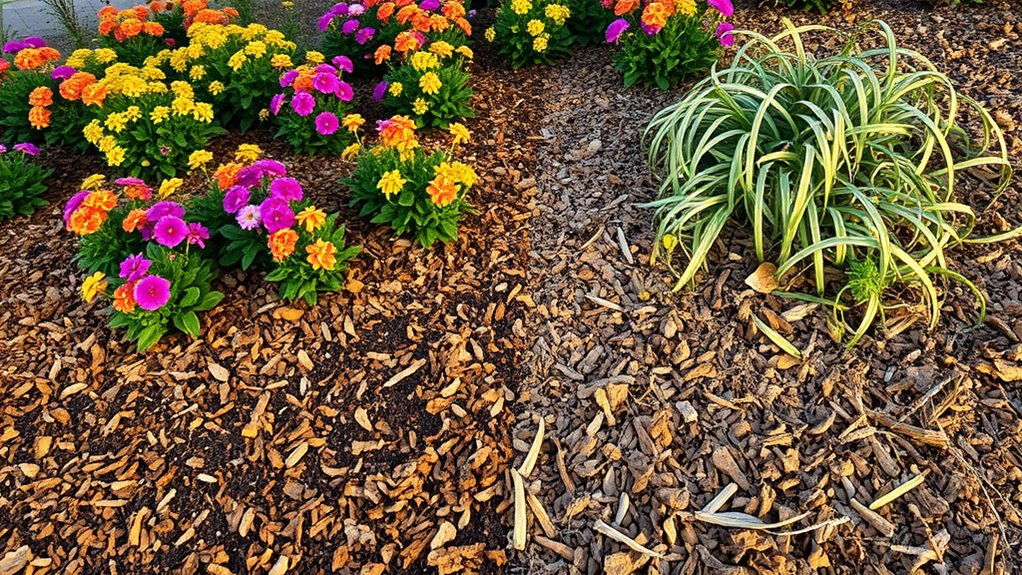My Garden Survived the Heatwave – Thanks to These Organic Tricks
You’ve outsmarted that heatwave by using organic watering techniques like drip irrigation to target roots and cut evaporation. You’re applying natural mulching with straw or leaves to retain soil moisture and block the sun. Eco-friendly shades from bamboo and companion planting, such as basil with tomatoes, keep your plants thriving. Explore these methods further to refine your garden’s heat resistance and ensure ongoing success.
Key Takeaways
- Use drip irrigation to target plant roots directly, reducing evaporation by up to 50%.
- Apply a 2-4 inch layer of organic mulch like straw to minimize soil evaporation and regulate temperature.
- Build shade structures with bamboo and breathable fabrics to block up to 70% of UV rays.
- Incorporate compost into the top 6-8 inches of soil to enhance nutrient uptake and heat resilience.
- Pair heat-sensitive plants with tall sunflowers for natural shading and improved garden health.
Organic Watering Techniques for Heatwaves
As heatwaves intensify, you’ll protect your plants by adopting organic watering techniques that minimize water loss and support eco-friendly growth. Expert watering techniques help avoid common mistakes like overwatering, ensuring your plants remain vibrant and healthy.
In organic gardening in heat, you employ drip irrigation to target roots directly, slashing evaporation rates by up to 50%.
Water deeply in early mornings or evenings to penetrate soil efficiently, fostering robust root systems.
Use compost-enriched water to enhance nutrient uptake, ensuring plants thrive without synthetic aids.
Regularly check soil moisture with a simple meter; water only when the top inch dries, conserving resources and boosting resilience against extreme temperatures.
By applying these organic tricks, my garden successfully withstood scorching weather.
Natural Mulching Methods to Retain Moisture
To retain soil moisture effectively, you’ll apply natural mulching methods that use organic materials like straw, leaves, or wood chips.
These create a protective layer that minimizes evaporation by blocking sunlight and wind. Apply a 2-4 inch layer around plants, ensuring it doesn’t touch stems to prevent rot.
Straw insulates well in hot conditions, while leaves decompose to enrich soil. Wood chips suppress weeds and regulate temperature, reducing watering needs by up to 50%.
Additionally, mulching contributes to soil health by improving overall garden vitality through better nutrient retention and reduced erosion.
Monitor and replenish mulch seasonally for optimal results, promoting healthier roots and sustainable gardening practices.
By implementing these methods, you can unlock the power of mulching for a consistently moist and thriving garden.
Shade Solutions Using Eco-Friendly Materials
Shading your garden with eco-friendly materials protects plants from harsh sun, much like mulching conserves moisture. You can use bamboo poles or recycled fabrics for simple shade structures; these block up to 70% of UV rays while promoting airflow. These eco-friendly practices can also support natural pest control by fostering a balanced ecosystem that discourages harmful insects.
Construct a frame with sustainable wood, then drape breathable cotton or hemp cloth over it—ensure it’s secured against wind. For dynamic solutions, plant fast-growing vines like morning glory on trellises; they create natural canopies that adapt seasonally.
Monitor temperatures to adjust shades, keeping your ecosystem balanced and resilient during heatwaves. Additionally, integrating eco-friendly weed control methods can further enhance your garden’s health by reducing weed competition without environmental harm.
Soil Enhancement Strategies for Extreme Heat
While extreme heat can deplete soil nutrients and moisture, you can boost its resilience by incorporating organic amendments like compost or biochar.
These enhance soil structure, improving water retention and microbial activity to sustain plants. Add compost by tilling it into the top 6-8 inches of soil, boosting organic matter for better nutrient cycling. Embracing sustainable practices can reduce reliance on chemical fertilizers, promoting a healthier ecosystem overall.
Biochar helps retain moisture and reduces erosion; apply it at 5-10% by volume.
Regularly test soil pH and adjust with lime or sulfur if needed, ensuring optimal conditions.
Monitor and reapply amendments annually for long-term heat resistance.
For optimal compost, incorporate kitchen scraps and garden waste to further enhance soil health and promote sustainable practices.
Companion Planting for Heat-Resistant Gardens
Companion planting boosts your garden’s heat resistance by strategically pairing plants that support each other through shade, pest control, or enhanced soil health. These strategies can also increase crop yields by fostering more robust plant interactions based on proven gardening techniques.
You’ll enhance resilience by interplanting tall sunflowers with heat-sensitive greens like lettuce; their canopy shades and cools the soil, reducing evaporation.
Pair basil with tomatoes to repel pests naturally, keeping foliage healthier under stress.
For soil improvement, plant nitrogen-fixing beans alongside corn, boosting nutrient availability and water retention.
Experiment with these combinations—mix herbs, flowers, and veggies—to create a balanced, heat-tolerant ecosystem that thrives organically without synthetic aids.
Leveraging the scientific principles behind companion planting can help you discover even more effective pairings for optimal garden health.
Monitoring and Adjusting Organic Plant Care
To keep your organic garden thriving, regularly monitor your plants for signs of stress, pests, or nutrient imbalances.
Check leaves for discoloration or holes, test soil pH with a simple meter, and inspect roots for rot.
If you spot issues, act quickly: apply compost tea to correct nutrient deficiencies, introduce ladybugs to control aphids, or adjust watering to maintain even moisture.
Track weather patterns and use a journal to note changes, ensuring precise interventions.
This proactive approach minimizes damage and boosts resilience, helping your garden withstand future heatwaves effectively.
Stay vigilant for optimal results.
Moreover, incorporating organic techniques from effective heatwave strategies can further enhance your garden’s ability to thrive in extreme temperatures.
Furthermore, perform soil testing to identify and remedy potential soil-related problems that could affect plant health.





